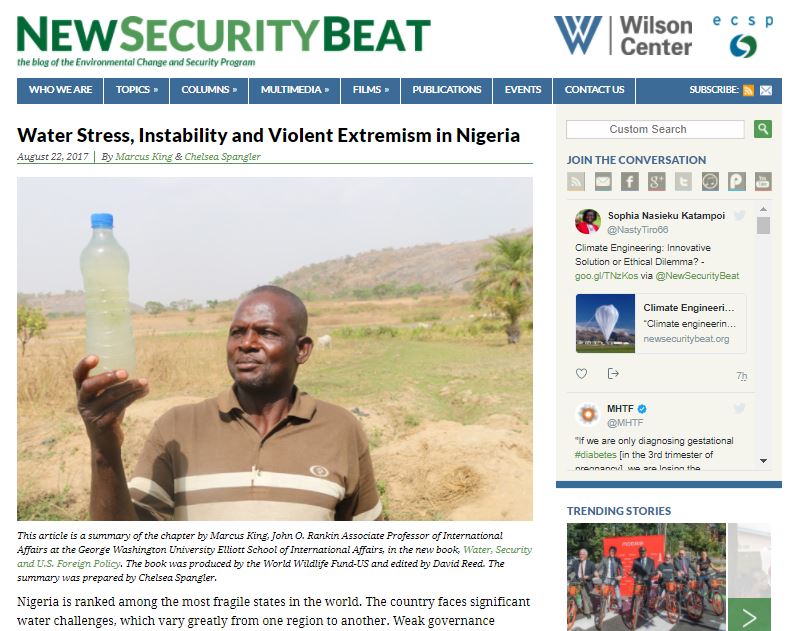Before further exploring Nigeria's water sector, I want to introduce another media source making the latest blog topic a matter of discussion.
An article in the The New Security Beat summarizes a chapter in a book called "Water, Security and U.S. Foreign Policy" by David Reed. The chapter discusses the relationship of Water in Nigeria and Climate Change - which, in the light of my current series on Water in Nigeria, has not lost any relevance since its publication some months ago. The article outlines three major sources of conflict over water in the country, one of which I also elaborated further (have a look at my Lake Chad post) and one of which my next blog post will include (stay tuned!). In short, Nigeria is considered one of the least-ready countries worldwide to combat consequences of global warming (according to the Notre Dame Global Adaption Index). These consequence again fuel conflicts in different spheres: In the North, around Lake Chad and a Boko Haram hot spot, around the Middle Belt, where changing precipitation patterns and friction between Muslim Fulani Herders and Christian Farmers intensifies and around the Niger Delta, where the (partially water contaminating) Oil Industry and militant groups are in conflict over land rights and conservation. Bearing in mind the very Americanized view on these issues (for the US for instance, Nigeria is of special interest for its foreign relations due to Nigeria's involvement in curbing the influence of the Al Qaeda terror group in Northern Africa), I nevertheless recommend having a look at the whole article. Further, I found the above-mentioned Index very interesting, the website to the ranking can be found here.
An article in the The New Security Beat summarizes a chapter in a book called "Water, Security and U.S. Foreign Policy" by David Reed. The chapter discusses the relationship of Water in Nigeria and Climate Change - which, in the light of my current series on Water in Nigeria, has not lost any relevance since its publication some months ago. The article outlines three major sources of conflict over water in the country, one of which I also elaborated further (have a look at my Lake Chad post) and one of which my next blog post will include (stay tuned!). In short, Nigeria is considered one of the least-ready countries worldwide to combat consequences of global warming (according to the Notre Dame Global Adaption Index). These consequence again fuel conflicts in different spheres: In the North, around Lake Chad and a Boko Haram hot spot, around the Middle Belt, where changing precipitation patterns and friction between Muslim Fulani Herders and Christian Farmers intensifies and around the Niger Delta, where the (partially water contaminating) Oil Industry and militant groups are in conflict over land rights and conservation. Bearing in mind the very Americanized view on these issues (for the US for instance, Nigeria is of special interest for its foreign relations due to Nigeria's involvement in curbing the influence of the Al Qaeda terror group in Northern Africa), I nevertheless recommend having a look at the whole article. Further, I found the above-mentioned Index very interesting, the website to the ranking can be found here.
 |
| Source: www.newsecuritybeat.org/2017/08/water-stress-instability-violent-extremism-nigeria/ |
Thx for the superb recommendation! So sad, poor countries having to deal with the outcome of our ignorance...
ReplyDeleteYes, interesting point considering the natural resources of the country make it a what one could consider "rich" country.
DeleteThanks for the recommendation - it's always interesting to get a look into first-hand resources!
ReplyDeleteYou're very welcome!
Delete